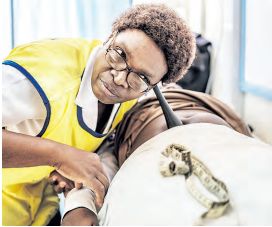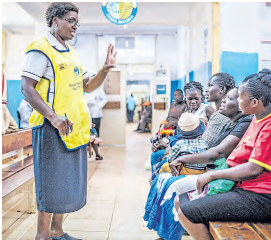
Catherine Nyiva’s first pregnancy was difficult. She didn’t know what to expect. “I was very scared,” she said. “At the clinic, we did not have time to talk to nurses one-on-one, to express our fears, to ask questions.”
Eventually, Nyiva delivered a healthy baby girl. But it took a long time to rid herself of the anxiety of pregnancy and childbirth.
Nyiva’s daughter, Stacey, is now 10 years old, an attentive, curious girl. Nyiva is pregnant with her second child.
This time, she sought care at the Vihiga County Referral Hospital, one of 61 Kenyan health facilities that train healthcare workers on integrating HIV, tuberculosis and malaria services into personal care for mothers-to-be and newborns.
The training is provided through a partnership among local health authorities, the Global Fund and the Liverpool School of Tropical Medicine.
It is funded by Japan’s Takeda Pharmaceutical Company Limited’s Global Corporate Social Responsibility Programme.
Takeda is Asia’s third-largest pharmaceutical company. In Kenya, HIV, TB and malaria impact millions of people every year.
According to the World Health Organization, Kenya had an estimated five million malaria cases in 2022 – many of them among pregnant women and children under five.
TB is the fourth-leading cause of death among communicable, maternal and neonatal diseases. Kenya is one of the top high-burden countries for HIV.
Pregnancy is one of the few, almost-guaranteed periods when many women and families seek out healthcare – a critical opportunity to test for, treat and prevent disease.
“For most of the clients who come to our facility, nurses and midwives are the first healthcare workers they get in contact with,” nurse and administrator Amina Baraka at Vihiga County Referral Hospital said.
The nursing staff has been increased to give more time to patients. In addition to administering physical and regular antenatal checkups, Amina and her colleagues test expectant mothers – and often, family members who join them at the clinic – for HIV.

They provide antiretroviral medications to women who test positive to prevent mother-to-child transmission. Nurses also screen mothers for TB and malaria and offer medication, advice and tools to prevent diseases – which can be especially dangerous for pregnant women and babies.
They take detailed histories to identify risk factors for illness and harm, including intimate partner violence. The training builds trust and confidence among patients and providers.
“This time around was very different. The nurses were so open, so supportive – I could talk to them about any challenge, anything and everything,” Nyiva said.
When nurse Evalyn Omusonga started on the labour ward seven years ago, it was often understaffed. “You would find yourself alone, with 10 or 12 deliveries,” she recalled.
As part of the integrated care training, she began working with early-career nurses – offering advice, fostering talent and teaching them how to build relationships with and serve mothers like Nyiva.
Today, Omusonga oversees 14 labour ward nurses, each trained in the same programme.
She facilitates regular group antenatal clinics, which bring together healthcare providers and 10 or 12
pregnant women to discuss what to
do and expect before, during and
after childbirth.










